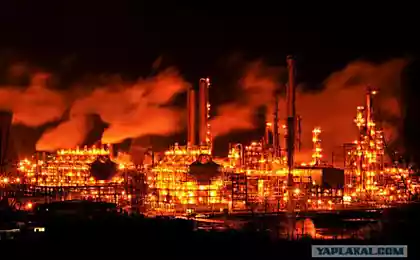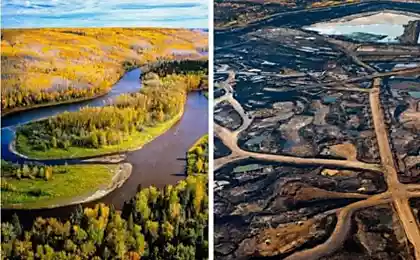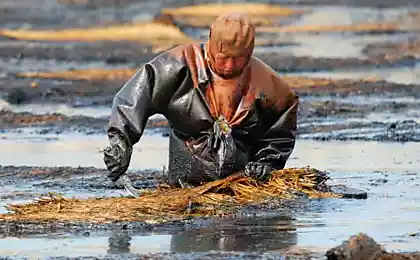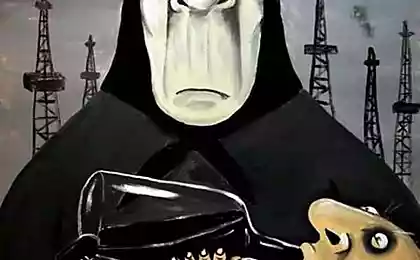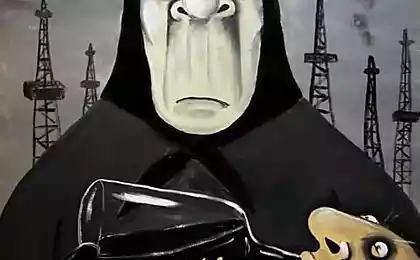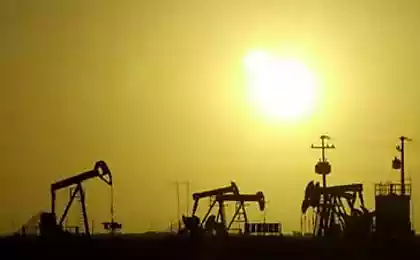643
Oil and gas will not ever run out?
Letters are many, but the information is very interesting!
Do we know the real truth about the oil and gas reserves? Why profitable oil companies to adjust their oil reserves? Why are oil reserves in the Russian secret and protected by law? Why geology - not an exact science? And will there be enough oil to us before the end of the millennium?
I am a geologist, geophysicist at the second specialty. Therefore, the latest study materials scientists on "sustainability" of oil and gas will take great pleasure. I will try to share this information with you. Here are ambulatory. In the first year MGRI (Moscow Geological Prospecting Institute), our teacher said, "Do you know why astrology became astronomy and geology, and remained in geology?
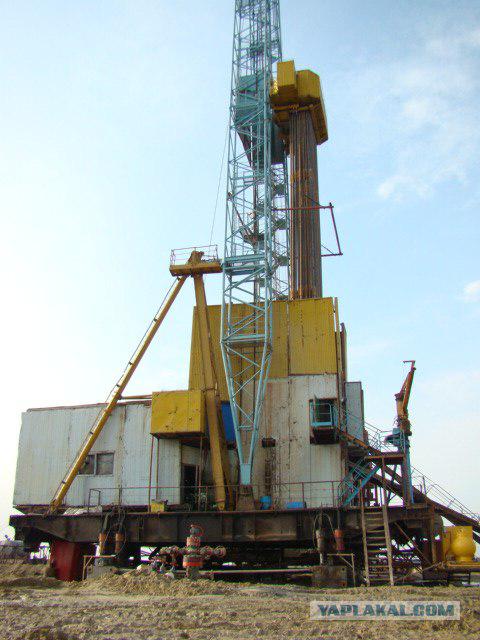
Enchanted audience was silent. But because the science, I will teach you, in general practically does not know anything about what's going on deep in the earth. Our knowledge is based only on the vast experience of research, but attempts to build a consistent theoretical model constantly breaking on exceptions that occur in everyday practice. Therefore, we, as astrologers, never become an exact science. So we write the theme: Eight main hypotheses for the origin of the earth ... ". Upon graduation, I was left with questions more than answers.
How to study oil and gas reserves? Very simple. On the surface of the ground made the explosion, the shock wave penetrates the earth, is reflected and comes back. There she geophones capture, record fluctuations in the tape, and then the computer is building on these data profile of the crust, which shows the cavity filled with oil, gas, etc. This theory. In practice, our knowledge about the Earth's depths is limited layer (surface) Moho. From 5 to 70 km in different parts of the globe. I will tell you a secret - the science does not know what's going on at this layer. There are vague hypothesis, contradictory one another and all of them are not working. That's the longest ambulatory, what would you have been more interesting.
And what is the oil and gas? That is the definition of banal:
Crude oil - natural flammable liquid, which is in deep sediments and well known for its use as a fuel and raw material for the chemical industry. Chemically oil - a complex mixture of hydrocarbons with different carbon atoms in the molecule; in their composition may contain sulfur, nitrogen, oxygen, and minor amounts of some metals.
Nature (petroleum) gas consisting of methane and other light saturated hydrocarbons, - a very cheap and convenient fuel. All. All other attempts to identify and understand what it is, it's guesswork.
Until recently, scientists believed that all the world's known deposits, stocks are counted, the rate of production is determined, and in 30-40 years, all the "legkodobyvaemye" reserves of these minerals are almost exhausted.
Thus, Mendeleev first drew attention to the fact that oil is a major source of chemical raw materials, not only the fuel; he dedicated a series of works origin and rational refining. He owns a famous saying: "Oil - no fuel to heat and banknotes can be" (assuming that the pulp bills - and less valuable renewable source of raw material than oil)
For 130 years, co-exist two theories on this. According to the first, a recognized oil - non-renewable resource, has an organic origin and is formed with the participation of the remains of the ancient flora and fauna.
An alternative theory suggests inorganic origin: is formed due to the water cycle. Thus, the water carries the hydrocarbons react with hydrogen from the earth. Therefore oil - a renewable resource.
Referring to the practice.
So, in the world famous specialist of the Institute of Oil and Gas Problems, Russian Academy of Sciences Azary Barenbaum sure: the traditional view that oil is formed from the remains of dead organisms, is fundamentally wrong. He developed the theory of Mendeleev, and simultaneously refuted the theory of the greenhouse effect. How it all happen? The carbon released to the atmosphere, washed out by rain and rain water falls back into the ground in the form of hydrogen. Simultaneously with the accumulation of carbon in the crust deep in the bowels of the mantle allocated powerful streams of hydrogen. At high temperatures and pressure, chemical reactions occur as a result of which there are gases, including methane and oil droplet. And most surprisingly, the whole process does not take place for millions, and in just a few decades.
Conclusions scientists confirm the resumption of oil reserves has long operated in the oil and gas fields, and then abandoned in the 40-50s of the last century: in Tatarstan, Chechnya, Mexico, the US states of Texas and Oklahoma.
Here's an example: One of them - an inexplicable phenomenon of growth stocks of existing fields. Let me explain with an example. When oil was discovered in Tatarstan, its reserves estimated at 709 million. Tons. Errors like was not. However, today in Tatarstan has produced almost four times more oil than was predicted - about 2, 7 billion. Tons. And to end the Tatar oil is not going in the near future ...
One of the authors of the discovery, Professor Victor Gavrilov GANG can spend hours listing examples of such "anomalies". The essence of his theory - nature is able to replenish their treasuries. It is known that hydrocarbons are constantly rising from the depths to the surface of the planet's crust. It was believed that this happens very slowly. To restore the stocks of deposits need tens of millions of years.
But scientists from the Ganges sure that the process is much faster. To re-fill the hole "black gold", enough time comparable to the duration of human life. "We have conducted experiments on Talinskoye field in Western Siberia. It was found that the velocity of the fluid oil (volatile oil components) from hole to hole is about 6 km per day, "- says Gavrilov.
If oil and gas prices really will be renewable resources, this is not surprising. They - one of the major mysteries of nature. Known for their chemical composition, improved methods of production, but their origins - a mystery.
By the way, it is believed that absolutely accurate information (state) of the actual oil reserves in Russia. The gas reserves are known, they are published, and oil - no - prohibited since the Soviet era. Is it, I sure could not figure out. Opinions fellow experts were divided. However, there is the claim that the actual reserves in Russia is 3-4 times more than according to the BP Statistical review of world energy in 2009 - 79 billion. Barrels. However, there is another point of view, that the Earth's oil reserves are now deliberately inflated in order to avoid panic and monstrous rising prices.
So, what we have come? Geologists do not know the true oil reserves, and politicians and businessmen these figures are manipulated depending on the circumstances. But roughly, it can be assumed by the numerous publications that the oil and gas reserves in Russia will last until the end of the millennium. Thus, the cause for panic among Earthlings not. And the theory of the "sustainability" of oil and gas I really liked because of its consistency and confirm the real facts. So, I think that in this matter we can be optimistic and remember a chapter of the book of Dale Carnegie, How to Stop Worrying and Start Living.
And "a snack" - a small story about the errors of intelligence. On the 100th anniversary of the birth of VI Lenin in 1970 in the Soviet Union decided to drill the deepest hole in the world. Geophysicists were looking for a place for a long time and finally found it. On the Kola Peninsula. The well named "Kola ultradeep". According to intelligence reports the well had to cross a huge number of layers and provide invaluable information about the structure of the Earth. Did not work! Instead, all drawn from the well layers fetched only granite. And nothing but the granite - 12,262 meters of granite. This investigation was the reason for the endless jokes between geologists of geophysicists. Still. What proves the theory without practice is dead, but the tree of life is green magnificently. Take care of yourself.
Author: Victor Gavrilenko
via
Source:
Do we know the real truth about the oil and gas reserves? Why profitable oil companies to adjust their oil reserves? Why are oil reserves in the Russian secret and protected by law? Why geology - not an exact science? And will there be enough oil to us before the end of the millennium?
I am a geologist, geophysicist at the second specialty. Therefore, the latest study materials scientists on "sustainability" of oil and gas will take great pleasure. I will try to share this information with you. Here are ambulatory. In the first year MGRI (Moscow Geological Prospecting Institute), our teacher said, "Do you know why astrology became astronomy and geology, and remained in geology?

Enchanted audience was silent. But because the science, I will teach you, in general practically does not know anything about what's going on deep in the earth. Our knowledge is based only on the vast experience of research, but attempts to build a consistent theoretical model constantly breaking on exceptions that occur in everyday practice. Therefore, we, as astrologers, never become an exact science. So we write the theme: Eight main hypotheses for the origin of the earth ... ". Upon graduation, I was left with questions more than answers.
How to study oil and gas reserves? Very simple. On the surface of the ground made the explosion, the shock wave penetrates the earth, is reflected and comes back. There she geophones capture, record fluctuations in the tape, and then the computer is building on these data profile of the crust, which shows the cavity filled with oil, gas, etc. This theory. In practice, our knowledge about the Earth's depths is limited layer (surface) Moho. From 5 to 70 km in different parts of the globe. I will tell you a secret - the science does not know what's going on at this layer. There are vague hypothesis, contradictory one another and all of them are not working. That's the longest ambulatory, what would you have been more interesting.
And what is the oil and gas? That is the definition of banal:
Crude oil - natural flammable liquid, which is in deep sediments and well known for its use as a fuel and raw material for the chemical industry. Chemically oil - a complex mixture of hydrocarbons with different carbon atoms in the molecule; in their composition may contain sulfur, nitrogen, oxygen, and minor amounts of some metals.
Nature (petroleum) gas consisting of methane and other light saturated hydrocarbons, - a very cheap and convenient fuel. All. All other attempts to identify and understand what it is, it's guesswork.
Until recently, scientists believed that all the world's known deposits, stocks are counted, the rate of production is determined, and in 30-40 years, all the "legkodobyvaemye" reserves of these minerals are almost exhausted.
Thus, Mendeleev first drew attention to the fact that oil is a major source of chemical raw materials, not only the fuel; he dedicated a series of works origin and rational refining. He owns a famous saying: "Oil - no fuel to heat and banknotes can be" (assuming that the pulp bills - and less valuable renewable source of raw material than oil)
For 130 years, co-exist two theories on this. According to the first, a recognized oil - non-renewable resource, has an organic origin and is formed with the participation of the remains of the ancient flora and fauna.
An alternative theory suggests inorganic origin: is formed due to the water cycle. Thus, the water carries the hydrocarbons react with hydrogen from the earth. Therefore oil - a renewable resource.
Referring to the practice.
So, in the world famous specialist of the Institute of Oil and Gas Problems, Russian Academy of Sciences Azary Barenbaum sure: the traditional view that oil is formed from the remains of dead organisms, is fundamentally wrong. He developed the theory of Mendeleev, and simultaneously refuted the theory of the greenhouse effect. How it all happen? The carbon released to the atmosphere, washed out by rain and rain water falls back into the ground in the form of hydrogen. Simultaneously with the accumulation of carbon in the crust deep in the bowels of the mantle allocated powerful streams of hydrogen. At high temperatures and pressure, chemical reactions occur as a result of which there are gases, including methane and oil droplet. And most surprisingly, the whole process does not take place for millions, and in just a few decades.
Conclusions scientists confirm the resumption of oil reserves has long operated in the oil and gas fields, and then abandoned in the 40-50s of the last century: in Tatarstan, Chechnya, Mexico, the US states of Texas and Oklahoma.
Here's an example: One of them - an inexplicable phenomenon of growth stocks of existing fields. Let me explain with an example. When oil was discovered in Tatarstan, its reserves estimated at 709 million. Tons. Errors like was not. However, today in Tatarstan has produced almost four times more oil than was predicted - about 2, 7 billion. Tons. And to end the Tatar oil is not going in the near future ...
One of the authors of the discovery, Professor Victor Gavrilov GANG can spend hours listing examples of such "anomalies". The essence of his theory - nature is able to replenish their treasuries. It is known that hydrocarbons are constantly rising from the depths to the surface of the planet's crust. It was believed that this happens very slowly. To restore the stocks of deposits need tens of millions of years.
But scientists from the Ganges sure that the process is much faster. To re-fill the hole "black gold", enough time comparable to the duration of human life. "We have conducted experiments on Talinskoye field in Western Siberia. It was found that the velocity of the fluid oil (volatile oil components) from hole to hole is about 6 km per day, "- says Gavrilov.
If oil and gas prices really will be renewable resources, this is not surprising. They - one of the major mysteries of nature. Known for their chemical composition, improved methods of production, but their origins - a mystery.
By the way, it is believed that absolutely accurate information (state) of the actual oil reserves in Russia. The gas reserves are known, they are published, and oil - no - prohibited since the Soviet era. Is it, I sure could not figure out. Opinions fellow experts were divided. However, there is the claim that the actual reserves in Russia is 3-4 times more than according to the BP Statistical review of world energy in 2009 - 79 billion. Barrels. However, there is another point of view, that the Earth's oil reserves are now deliberately inflated in order to avoid panic and monstrous rising prices.
So, what we have come? Geologists do not know the true oil reserves, and politicians and businessmen these figures are manipulated depending on the circumstances. But roughly, it can be assumed by the numerous publications that the oil and gas reserves in Russia will last until the end of the millennium. Thus, the cause for panic among Earthlings not. And the theory of the "sustainability" of oil and gas I really liked because of its consistency and confirm the real facts. So, I think that in this matter we can be optimistic and remember a chapter of the book of Dale Carnegie, How to Stop Worrying and Start Living.
And "a snack" - a small story about the errors of intelligence. On the 100th anniversary of the birth of VI Lenin in 1970 in the Soviet Union decided to drill the deepest hole in the world. Geophysicists were looking for a place for a long time and finally found it. On the Kola Peninsula. The well named "Kola ultradeep". According to intelligence reports the well had to cross a huge number of layers and provide invaluable information about the structure of the Earth. Did not work! Instead, all drawn from the well layers fetched only granite. And nothing but the granite - 12,262 meters of granite. This investigation was the reason for the endless jokes between geologists of geophysicists. Still. What proves the theory without practice is dead, but the tree of life is green magnificently. Take care of yourself.
Author: Victor Gavrilenko
via
Source:


